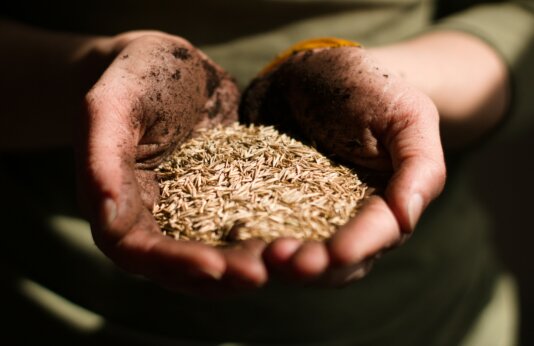- About
- Topics
- Story
- Magazine
- In-Depth
- Picks
- Opinion
- News
- Donate
- Signup for our newsletterOur Editors' Best PicksSend
Read, Debate: Engage.
| topic: | Sustainable Agriculture |
|---|---|
| tags: | #COP30, #Brazil, #Plant health |
| located: | Brazil |
| by: | Rose Souza Richards |
As the world gathers in Belém for the UN COP30 climate talks, the links between climate, food, and health have never been clearer. There could be no more fitting host than my home country, Brazil. An agricultural powerhouse and home to the lungs of our planet, the Amazon.
I have worked as a plant health scientist for over 20 years, in academia and government in Brazil, the United Kingdom, South Africa, and New Zealand, championing science-based regulations for seed importation, biosafety, and biodiversity promotion, among other areas.
Now, in my role as Phytosanitary Affairs Manager for the International Seed Federation – whose members’ activities represent 96 per cent of the international seed trade – I sit in global discussions and continuously see that seeds, as the starting point of the planetary health chain, remain under-recognised.
Seeds sit at the intersection of biodiversity, food security, and climate resilience. Yet, as climate change accelerates the spread of plant diseases, seed health is increasingly under threat. Meanwhile, inconsistent and unscientific regulations risk exacerbating the situation.
With land use and food systems set to be a central theme of this year’s climate negotiations, it is time that leaders recognise that no climate solution can succeed without healthy seeds.
Seeds are more than the starting point of crops; healthy, high-quality seeds sustain soil health, reduce pesticide dependence, and underpin the diversity and nutrition of our diets.
Within the One Health framework, which recognises the interconnectedness of human, animal, and environmental wellbeing, seed health is the very first link in the chain. But this link is under strain.
Rising temperatures, unpredictable seasons, erratic rainfall, and prolonged droughts are some of the climate change-aggravated shifts to weather patterns, which accelerate the spread of plant diseases. It is a silent yet mounting threat to seeds and, by extension, planetary health.
In Brazil, this year’s COP30 host, for example, tomato-infecting begomoviruses transmitted by whiteflies – whose populations tend to increase in warmer conditions – are an escalating phytosanitary threat that may worsen under climate change. It is a vivid example of how climate change isn’t a distant phenomenon, but a powerful force that is creating new challenges for farmers each growing season.
Faced with the growing threat of plant diseases, many governments react with extreme caution, tightening rules on seed trade and innovation in an effort to protect their borders and crops. Still, as caution strays from science, it can do more harm than good. Inconsistent and overly restrictive regulations are now commonplace, applied differently from one country to the next. This patchwork of rules stifles innovation and hinders the movement of high-quality seeds, which leaves farmers without the necessary tools to adapt to the new challenges of each season.
The consequences of poor access to high-quality seeds are real: reduced resilience in the field, instability in food systems, and increased vulnerability across ecosystems.
A clear example comes from the case of Candidatus Liberibacter solanacearum (CLso) in carrot and parsley seeds. Despite nine independent studies – conducted by research authorities and institutes in France (ANSES), Japan, Finland, and New Zealand – confirming that CLso is not seed-transmitted and spreads only through psyllid vectors, some countries continue to maintain import restrictions.
These measures persist even in the face of a strong scientific consensus, which demonstrates how unscientific policies can take root and prove stubbornly resistant to evidence.
As temperatures rise, plant diseases proliferate, and growing conditions become increasingly unpredictable, this fragmented, risk-averse approach is unsustainable. Without science-based cooperation, the costs to farmers, consumers, and ecosystems will continue to grow.
However, as host of COP30, Brazil has both the opportunity and responsibility to spearhead a more unified, science-driven approach to seed health.
The country is soon to account for one-quarter of global agricultural exports, and it remains the world’s most biodiverse nation. Brazil embodies the balance the world needs between protecting ecosystems and feeding billions of people.
The global seed sector is already showing what this balance can look like. Through initiatives such as the Systems Approach for Seeds, the Regulated Pest List Initiative, and the International Seed Health Initiative for Vegetable Crops, science and collaboration are building the trust necessary for a safe and efficient seed trade.
These partnerships demonstrate that when governments and the private sector collaborate, innovation and biosecurity can advance in tandem.
Suppose COP30 embraces this spirit of cooperation, embedding seed health and science-based regulation within its food and land use agenda. In that case, Brazil can – quite literally – help sow the seeds of a climate-resilient future.
Because healthy lands and healthy lives begin with healthy seeds, and with policies grounded in science. Harmonising seed regulations enables us to protect biodiversity, empower farmers, and secure food systems for generations to come.
In Belém, the world has a chance to recognise seeds for what they truly are: one of the smallest yet most powerful levers for planetary health.
Let’s not overlook them again.
Image by Vince Veras.
